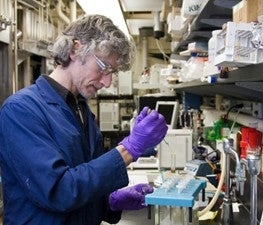Background
The global protein purification and isolation market size was valued at USD 7.8 billion in 2021 and is expected to grow at a compound annual growth rate (CAGR) of 10.5% from 2022 to 2020, reaching USD 19.16 billion by 2030. Drug discovery relies on the structural information of a protein to predict its potential efficacy. Common technologies used during this process include mass spectroscopy, amino acid sequencing, x-ray crystallography, nuclear magnetic resonance, and surface plasmon resonance. Most of these methods require highly purified protein samples, and often in large quantities ranging from ug to mg. However, current purification technologies involving chromatography or gel/capillary electrophoresis are batch modes rather than continuous, and this limits the throughput. Furthermore, they may require harsh solvents or detergents that will damage the protein or alter its structural properties.
Description of the invention
UWaterloo’s Free-Flow Counterflow Gradient Focusing (FFC-GF) technology provides a novel, disruptive, high performance, scalable and cost-effective system that enables the separation and collection of large quantities of proteins (e.g., 1 mg) from complex mixtures in a significantly short period of time (i.e., few hours instead of current state-of-the-art’s capability of 20 days for half this quantity - 0.5 mg) while preserving their bioactivity.
Current competitive technologies cannot handle such large quantities of protein (greater than 0.5mg); operate only in batch mode where the sample is loaded prior to separation thereby requiring a much longer processing time (weeks instead of few hours to achieve mg level); are costly to manufacture; require harsh solvents or detergents that may harm the bioactivity of the solutes of interest.
The FF-CGF system addresses all of these limitations, as it uses gentle separation conditions based on pH selectivity, and by operating in continuous mode, it provides significant time and cost savings.
Advantages
-
Enables the separation and collection of large quantities of from complex mixtures in a significantly short period of time.
-
Protein purification with high resolution and high throughput (e.g., mg/hour vs. mg/month) while preserving their bioactivity and without the use of any harsh solvents or detergents.
-
Cost effective and can be used in mass production.
Potential applications
-
Isolate the charge variants of monoclonal antibodies, bispecific antibodies, fusion proteins, antibody/drug conjugates, and more. Identify the underlying structural modifications to simplify/accelerate the regulatory approval process.
-
Isolate large quantities of intact viral vectors for gene therapy. For example, separate full and empty adeno-associated viruses (AAVs).
-
Analyze AAVs, mRNA vaccines, and other bioparticles during product development and manufacturing.
-
Healthcare industry for biomarker discovery, target identification, etc.

Reference
10235
Patent status
Patent filed
Stage of development
Prototype developed and currently being validated
Contact
Scott Inwood
Director of Commercialization
Waterloo Commercialization Office
sinwood@uwaterloo.ca
uwaterloo.ca/research